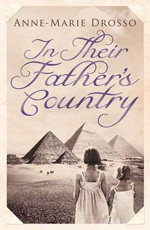
Anne-Marie Drosso has chosen this unusual approach to tell us Claire Sahli's story—each chapter chronicles the death of someone who has mattered to Claire. Beginning with her father's death in 1924 and ending with her sister's death in 1998, and set against the undercurrent of a politically turbulent 20th century Egypt, the story follows Claire, and to a lesser extent her older sister Gabrielle, skipping through the years and decades, pausing to linger and focus intermittently. This revelation of a life is mesmerizing, and we are soon absorbed in Claire's story.
Claire is beautiful and stylish, and attracts attention wherever she goes. Yet, unlike her sister, she is reserved, unsettled and often indecisive. After the death of her father, she marries very young to a much older man. She occasionally takes lovers. She has four children: three daughters and a son who dies in infancy. Oftentimes we get to hear Claire's inner thoughts more directly through letters and journal entries; there is a sense of a life not quite lived.
Claire and her family are Egyptians of Levantine and other Mediterranean descent, whose place is insecure as Egypt's culture undergoes increasing homogenization. Born in Egypt with legal citizenship, but lacking "legitimacy in quite a fundamental sense," she is part of a population often referred to by locals as khawagas. "And what are we? Viewed with suspicion on all sides. Without anchor." Less a story of identity, the story seems more an exploration of the resulting sense of rootlessness. Claire seems to have internalized this fundamental insecurity and the unsettled atmosphere of the world around her, making it part of who she is.
One of the more powerful chapters, I thought, was that which dealt with the death of her infant son in 1947. Bombs are exploding in Cairo. The Muslim Brotherhood is telling the people they must fight if they want the British to leave. There is talk that the brotherhood will soon be banned. Against this tide of political fervor is the story of Claire's pregnancy and short-lived relationship with this tiny being, Yves, told mostly through journal entries written in a leather-bound diary, a baby gift from her cousin, Iris. Yves is sickly, fails to eat, and eventually after some days, he is sent to the hospital where he dies. Claire refuses to see him there, or attend the funeral
With so much loss, one would expect the story to be morose, or at the very least melancholy, but it is not; it is respectively
subdued, and has a more contemplative tone. At a mere 223 pages, In Their Father's Country is a beautifully
written story of love and loss, family and nation, and one woman's traverse through the century.

Telegram Books, paperback, 9781846590597
